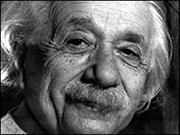 |
| Einstein's work was influential in the development of the atomic bomb |
| 1955: Albert Einstein dies |
England have
Albert Einstein has died in hospital in Princeton, New Jersey, aged 76. The eminent scientist and originator of the theory of relativity was admitted to hospital three days ago with an internal complaint.
In recent years Dr Einstein had lived a secluded life although he was still a member of staff at the Institute for Advanced Study at Princeton University.
In a statement issued following the scientist's death, US President Dwight Eisenhower said: "No other man contributed so much to the vast expansion of the 20th century knowledge.
"Yet no other man was more modest in the possession of the power that is knowledge, more sure that power without wisdom is deadly.
"To all who live in the nuclear age, Albert Einstein exemplified the mighty creative ability of the individual in a free society."
'Disruptive' behaviour
Albert Einstein was born on 14 March 1879 to Jewish parents at Ulm, Wurttenburg in Germany.
Soon afterwards the family moved to Munich where the young Einstein began his education at the Luitpold Gymnasium.
His early academic career was notable only for the fact he was asked to leave his school for "disruptive" behaviour.
But he had always excelled at mathematics - a subject which would later make him the most renowned scientist in the world.
In 1896 Einstein entered the Swiss Federal Polytechnic School in Zurich to train as a physics and maths teacher.
But he struggled to get a job, largely due to the fact he was German, so, in 1902, he accepted a job as a technical assistant in the Swiss Patent Office.
It was during his seven years at the Patent Office that, in his spare time, he worked on his mathematical theories which would eventually take the world by storm.
The Special Theory of Relativity, which describes the motion of particles moving close to the speed of light, was published in 1905.
In the years that followed, Einstein took up senior academic posts in Berne and Zurich. In 1911 he became Professor of Theoretical Physics in Prague but returned to Zurich a year later.
However, well-known German physicists, Walter Nernst and Professor Planck, were eager for Einstein to return to Berlin.
In 1913 they persuaded him to take up the position of director of the projected research institute for physics in the University of Berlin and become a member of the Royal Prussian Academy of Science.
Einstein's General Theory of Relativity was published in 1916 and in 1922 he was awarded a Nobel Prize for his works.
He kept the positions in Berlin until 1933, when he accepted a part-time post at Princeton University in America.
His plan was to divide his time between Germany and America but in the same year the Nazis came to power and Einstein, being a Jew, never returned to hisbirthland.
|